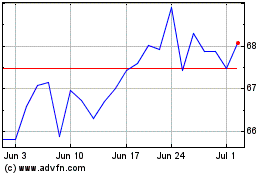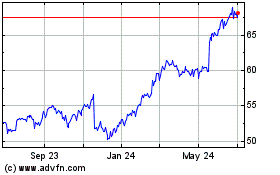By Sarah Nassauer
For most of the past 20 years, Wal-Mart Stores Inc. has let
another company build and operate gas stations in the parking lots
of its stores. Now, the retailer has decided it wants to pump its
own gasoline.
Last week, Wal-Mart executives told Murphy USA Inc. that going
forward it will build and operate its own gas stations. Murphy will
continue to run the more than 1,000 locations it has already built
near Wal-Mart stores.
Although oil prices have tumbled in the past year, forcing
companies like BP PLC to slash thousands of jobs and Exxon Mobil
Corp. to halt stock buybacks, falling prices at the pump haven't
hurt gas-station owners. While revenue from fuel sales has fallen,
so have fuel expenses. Plus, cheaper gasoline leaves more cash in
drivers' pockets to buy cigarettes, snacks and other high-margin
merchandise.
Wal-Mart has run gas stations in front of its warehouse chain
Sam's Club since 1997 and already operates several hundred in front
of its approximately 4,500 Wal-Mart stores, said company spokesman
Randy Hargrove. But the largest seller of gasoline in front of U.S.
Wal-Mart stores is Murphy. When building new stores, Wal-Mart plans
to add its own gas stations to as many as possible, said Mr.
Hargrove.
The shift is a sign that Wal-Mart CEO Doug McMillon is pushing
to eke out profit from every corner as the retailer pours billions
into boosting e-commerce sales to fend off Amazon.com Inc. and
improve slow sales growth at stores, in part by raising minimum
wages for hourly employees in an effort to improve customer
service. The company has warned that profits could fall by as much
as 12% in the fiscal year that began this month, and it recently
closed more than 150 of its U.S. stores.
Like other retailers adding gas stations to parking lots,
Wal-Mart primarily sees selling gasoline as a way to lure more
shoppers to stores so they buy other, higher margin items in the
main store. Executives from Costco Wholesale Corp. said last year
that they hope to add pumps to as many of the warehouse retailer's
locations as possible, though Costco is already one of the largest
sellers of gasoline in the country.
Still, by running its own gas stations, Wal-Mart "can probably
get a little more margin themselves," selling gasoline and
cigarettes coupled with more profitable items like small bags of
chips or fountain drinks, said Brian Yarbrough, an analyst at
Edward Jones.
Wal-Mart has long embraced the philosophy of learning a business
from an outside company, and then finding a way to do it more
efficiently in-house. Since Mr. McMillon became CEO in 2014,
Wal-Mart has become increasingly averse to outsourcing.
The decision is a blow for Murphy USA, which had presented a
plan to Wal-Mart to build more gas stations in Wal-Mart parking
lots last January. Murphy had sought to expand a decades-old
partnership that helped propel Murphy into a company with $13
billion in annual sales. More than 1,000 of Murphy's roughly 1,300
gas stations are attached or near one of the retailer's stores.
Murphy held a call last week with investors to deliver the news,
highlighting a plan to grow without buying land from Wal-Mart
directly, while continuing to benefit from the stations they
already own. The company said it would use funds on share
repurchases and to potentially buy land for new gas stations within
a one-mile radius of Wal-Mart Supercenters.
"Our business model as a low-cost fuel provider allows us to
compete with anyone in the business, whether it is in a Wal-Mart
parking lot or a busy intersection down the street," Andrew Clyde,
CEO of Murphy, told investors.
The partnership between Murphy and Wal-Mart grew as major oil
companies withdrew from retail operations to focus on production
and refining operations.
But while the total number of U.S. filling stations has been in
decline for the past two decades, convenience stores and big-box
grocery stores that sell gasoline have been an area of growth,
according to Energy Analysts International, a consulting firm.
Wal-Mart's move to build future gas stations without Murphy
marks the unraveling of an unusual alliance first forged in 1996
between two large Arkansas companies. Murphy is based in El Dorado
in the southern part of the state; Wal-Mart is in Bentonville, the
northwest corner.
When Murphy executives first hoped to build stations in front of
retail locations in the late '90s, "being an Arkansas company, the
CEO at the time said we could work with Wal-Mart," said Mr. Clyde.
The partnership has cooled and been reignited in the past as new
Wal-Mart executives shift their opinion of how the retail behemoth
should sell gasoline, said Mr. Clyde, who grew up in El Dorado.
Under their partnership, Murphy leased and then bought land in
Wal-Mart parking lots and just adjacent to stores, selling cheap
gasoline, cigarettes and, later, some typical convenience store
items like fountain drinks. Supercenters with a gas station in
front have more than 2% higher sales than those without, according
to Murphy's Mr. Clyde. Murphy sells the gasoline at a discount for
customers using Wal-Mart credit cards and gift cards.
Teaming up with Wal-Mart allowed Murphy to profit with
Wal-Mart's rise. "We grew with the new growth of the Supercenters,"
said Mr. Clyde. Murphy will continue with plans to add about 60 gas
stations that were already in the works. When the company was spun
off from Murphy Oil Corp. in 2013, it cited its relationship with
Wal-Mart as one of its risk factors.
Last January, Murphy executives met with Wal-Mart CEO Mr.
McMillon and Wal-Mart U.S. CEO Greg Foran to pitch a plan to deepen
their ties. Murphy executives highlighted that Supercenters with
gas stations in front attract more shoppers and that Murphy had
expertise running stations, which are often low-margin operations,
said Mr. Clyde. The idea, Mr. Clyde recalled, was to take over
"another distraction for management, given everything else that is
on their plate."
Write to Sarah Nassauer at sarah.nassauer@wsj.com
(END) Dow Jones Newswires
February 03, 2016 19:08 ET (00:08 GMT)
Copyright (c) 2016 Dow Jones & Company, Inc.
Walmart (NYSE:WMT)
Historical Stock Chart
From Mar 2024 to Apr 2024

Walmart (NYSE:WMT)
Historical Stock Chart
From Apr 2023 to Apr 2024
